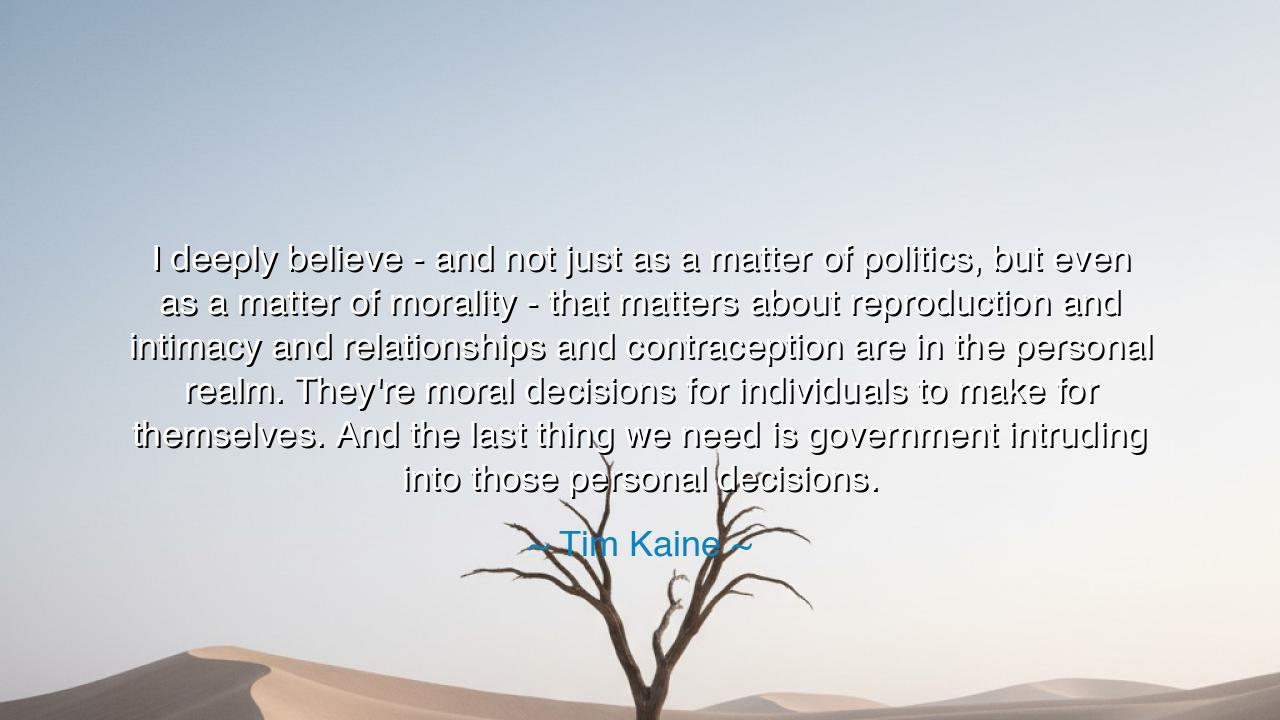
I deeply believe - and not just as a matter of politics, but even
I deeply believe - and not just as a matter of politics, but even as a matter of morality - that matters about reproduction and intimacy and relationships and contraception are in the personal realm. They're moral decisions for individuals to make for themselves. And the last thing we need is government intruding into those personal decisions.






Listen, O seekers of wisdom and dignity, and let the words of Tim Kaine settle upon your hearts: “I deeply believe – and not just as a matter of politics, but even as a matter of morality – that matters about reproduction and intimacy and relationships and contraception are in the personal realm. They're moral decisions for individuals to make for themselves. And the last thing we need is government intruding into those personal decisions.” In these words breathes the spirit of human sovereignty, the conviction that the most sacred choices belong not to rulers or institutions, but to the hearts of individuals. Kaine speaks not as a partisan, but as one who recognizes the sanctity of private conscience—the space where the state must tread lightly, or not at all.
From the earliest days of civilization, the tension between personal freedom and political authority has been a defining struggle. Kings, priests, and councils have long sought to regulate the most intimate aspects of human life: whom one may love, what family means, what faith one may follow. Kaine’s statement is born of this long history, one scarred by the suffering of those who dared to claim dominion over their own bodies and hearts. He reminds us that morality is not the property of the powerful; it is the birthright of the soul, and every person must answer to their own conscience before they bow to the law of men.
Consider the story of Margaret Sanger, who in the early twentieth century risked imprisonment to provide women with knowledge of contraception. At that time, the law forbade even the discussion of such matters, branding them as obscene. Yet Sanger saw the truth that Kaine later voiced: that matters of reproduction are deeply personal, moral in nature, and no government has the right to command them. Her defiance was not rebellion but reverence—for the autonomy of every human being to decide the course of their own life. Her legacy transformed not only law but the moral consciousness of entire generations.
Kaine’s words also echo the wisdom of the Enlightenment, when thinkers like John Locke and Voltaire taught that liberty begins with the freedom of thought and extends into the freedom of the body. Government, they said, was created to secure rights, not to dictate virtue. A state that legislates the intimate choices of its citizens commits a form of tyranny more insidious than open oppression—it claims authority over the inner sanctum of human experience, where love, faith, and life itself are decided.
But Kaine’s declaration is not a call to moral chaos; rather, it is an appeal to moral maturity. To say that decisions of reproduction, intimacy, and relationship belong to the individual is not to deny the existence of ethics—it is to affirm that true morality arises from conscience, not coercion. Laws may restrain actions, but only the heart can discern right from wrong in matters so bound to the soul’s deepest impulses. When the state intrudes into that sacred space, it diminishes both liberty and morality, for virtue imposed by law is virtue in chains.
In our age, where technology, medicine, and ideology intertwine, this truth becomes ever more vital. The temptation to let policy decide morality grows with the complexity of our world. Yet Kaine’s wisdom endures: we must guard the boundaries of private conscience against the encroachment of authority. Whether in matters of birth, love, or faith, the government’s role is not to command but to protect the freedom to choose—to ensure that each person may walk the path of their own convictions without fear.
The lesson, then, is both timeless and urgent: liberty without conscience is chaos, but conscience without liberty is slavery. Each individual must cultivate moral discernment, guided by empathy and reason, while demanding that government respect the dignity of personal choice. Defend the sanctity of privacy; resist the impulse to legislate the hearts of others; and honor the truth that what is most human in us—our love, our creation, our moral reflection—belongs first and foremost to ourselves.
Thus, Tim Kaine’s words stand as a torch of wisdom for generations to come: that freedom is not merely political—it is moral, and the measure of a just society is not how deeply it governs, but how wisely it refrains. Let every man and woman remember: to govern oneself is the highest act of citizenship, and to defend that right in others is the truest act of compassion.






AAdministratorAdministrator
Welcome, honored guests. Please leave a comment, we will respond soon